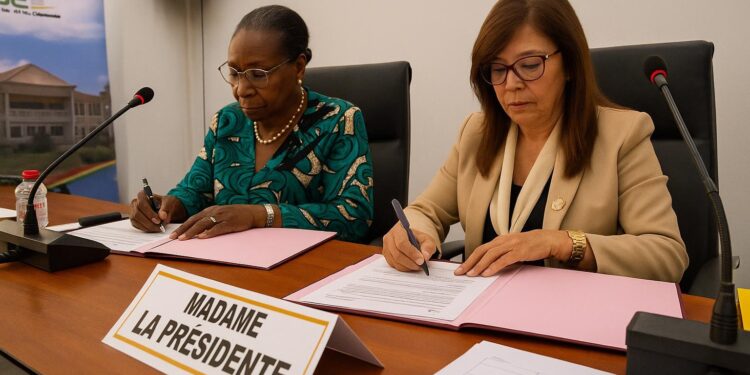Strategic Partnership Strengthens Sustainable Governance
Few accords signed in Brazzaville this year have resonated as strongly across policy circles as the memorandum concluded on 15 September 2025 between the Republic of Congo’s Economic, Social and Environmental Council, CESE, and the International Institute for Sustainable Transition in Africa, IITDA.
The signing ceremony brought together CESE president Emilienne Raoul and IITDA founder Professor Fatima Arib, two figures already acquainted through the International Days on Macroeconomics and Finance in Dakhla. Their renewed contact underlined a shared conviction that sustainable development must emerge from rigorous dialogue among institutions, territories and citizens.
Speaking after the signature, Raoul framed the pact as strategically aligned with CESE’s mandate to advise the executive on inclusive growth. She called Arib’s vision “pertinent”, stressing that development advances only when administrative expertise intertwines with territorial realities and when citizens participate in evidencing priorities and monitoring outcomes.
Training and Research Anchored in African Realities
The memorandum details several operational pillars. First, the partners will co-organise tailor-made training sessions and thematic workshops for public officials, private executives and civil-society leaders. In Raoul’s words, the intention is to supply decision makers with “robust analytical tools” capable of translating global sustainability standards into Congolese operational guidance.
Joint research constitutes the second pillar. Multidisciplinary teams will examine climate trajectories, green-economy opportunities, governance diagnostics and social-cohesion indicators. Results are expected to feed into the national climate plan, sectoral investment codes and municipal development dashboards, thereby strengthening the evidence base on which future fiscal and regulatory reforms will rely.
A third component focuses on institutional capacity. IITDA will provide technical accompaniment during the assessment of public policies, offering methodological templates for ex-ante cost-benefit reviews and ex-post impact evaluations. The approach seeks to institutionalise data-driven feedback loops rather than episodic project audits, a need frequently identified by development partners.
Creating Momentum for Evidence-Based Governance
Professor Arib, whose academic work explores territorial governance, argued that Africa’s demographic and environmental transitions oblige governments to adopt measurable sustainability pathways. She characterised the memorandum as “a turning point” because it creates a formal venue where researchers and policymakers can co-design solutions instead of exchanging aspirational communiqués.
She added that citizens, particularly youth and women entrepreneurs, should be included in every stage from diagnostic to monitoring. By mandating workshops open to startups, cooperatives and traditional authorities, the accord, she said, embeds social-justice considerations into technical planning and frames sustainable development as a collective economic opportunity.
Raoul echoed the inclusivity message, emphasising that CESE’s statutory consultations already bring together labour unions, business associations and environmental organisations. According to her, the IITDA partnership will deepen those consultations by introducing comparative metrics drawn from other African regions, thereby helping local stakeholders benchmark progress without importing templates blindly.
Implications for Investors and Development Partners
The memorandum arrives as Congo-Brazzaville sharpens its focus on climate-smart investment and diversified growth. Although hydrocarbons still anchor fiscal revenues, authorities have prioritised green corridors in the 2022-2026 National Development Plan, signalling openings in renewable energy, sustainable forestry and low-carbon logistics that foreign investors are actively assessing.
By promising policy evaluations grounded in data, CESE and IITDA intend to reduce information asymmetries that often deter long-term capital. For sustainability-linked loans or blended-finance facilities, investors insist on verifiable impact metrics. The forthcoming studies on climate risk and governance could therefore facilitate structuring bankable projects consistent with ESG criteria.
Development partners interviewed in Brazzaville describe the accord as complementary to the ongoing UN Sustainable Development Cooperation Framework. One regional multilateral official observed that CESE’s convening power “adds political traction” to technical recommendations, while IITDA’s academic network offers a channel for peer review, mitigating concerns about domestically produced data quality.
Charting the Next Steps
Both institutions have agreed to publish an inaugural joint roadmap within ninety days, outlining timelines for workshops, study deliverables and capacity-building missions. A digital repository will host policy briefs and methodological guides, ensuring accessibility for provincial administrations as well as diaspora experts eager to contribute to Congo’s sustainable transition.
Raoul closed the ceremony with an optimistic appeal: “We wish ourselves fair winds on this journey we shall write together.” The phrase, repeated across local media outlets, encapsulates a governance philosophy that favours collaboration over top-down decree and positions the CESE as a central broker of multisector dialogue.
For observers tracking Congo-Brazzaville’s reform momentum, the memorandum offers a mechanism to align national ambitions with actionable metrics. Its success will hinge on sustained commitment, yet the framework signed in Brazzaville shows that institutional partnerships can translate sustainable-development rhetoric into measurable gains for citizens and investors.
Investors contacted after the ceremony noted that clear governance roadmaps often act as risk-mitigation signals in frontier markets. They pointed to regional precedents where independent monitoring boosted credit ratings and lowered borrowing costs. Whether Brazzaville replicates such dividends will depend on swift implementation, transparent reporting and open stakeholder feedback.












































